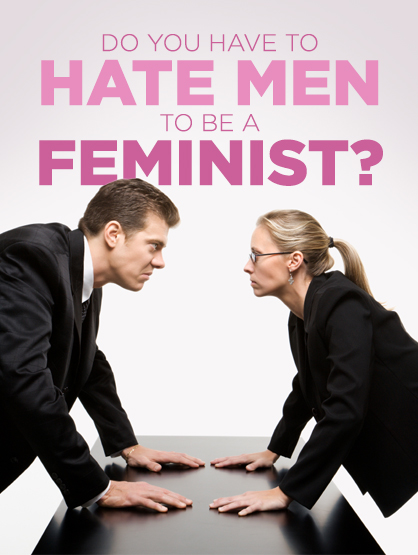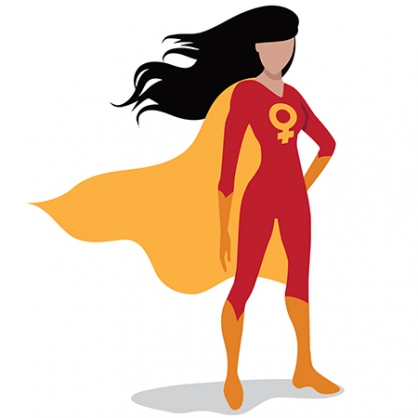What it Means to be a Feminist Today
How feminism has evolved
Some people have the misperception that you have to hate men in order to be a feminist. The truth couldn’t be farther from the reality.
Modern feminism began after World War II when women, who had gone to work during the war, were asked to leave their jobs so that men could work instead. “Giving up their jobs was considered their patriotic duty. What had been their patriotic duty during the war was now unwomanly, selfish, and just plain wrong,” said Susan Scher, writer, author and radio host.
“We needed a revolution. And these pioneers of the women’s movement gave it to us. Because of these women, and many others like them, you can now apply to medical school without people assuming you can’t get a husband. Because of these women, you can choose to be anything you want now. You can choose to establish your career before having children. You don’t even have to have children. You can do anything you want,” Scher said.
But what does feminism mean now, decades later? To find out, we conducted a roundtable to discuss this important topic. Participants included Scher, as well as Amy Vernon, tech consultant at Predictable.ly; Jenny Ungbha Korn, scholar of race, gender and online identity; and Farrah Parker, a Los Angeles marketing and public relations professional.


LadyLUX: Feminists are often perceived as men haters. Why is this?
Farrah Parker: Feminists are often perceived as “men haters” because of decades of powerful branding. Instead of equating the word with those who simply believe in equal rights for both genders, many uniformed Americans believe in the bra burning, man-bashing concept of feminism. When a woman proclaims, “I deserve every chance a man has,” fearful ears hear, “I want to take a man’s chance.” The push for equality is not about switching trends laced in dominance. True believers in equality would never advocate for role reversal where women are guilty of treating men in a dismissive and unworthy fashion. Confident men (and women) hear the word for its literal definition and not through an unfair lens that leads them to believe that the power shift will result in a new marginalized sex.
Because of this powerful example of improper branding, I refuse to label myself a “feminist.” The word is not bad at all. I have no gripes with any woman who chooses to call herself whatever it is that she truly believes. However, the moment “feminist” is uttered as a label, a huge percentage of the audience tunes out. As a firm believer in access for all, I start conversations without labeling. Instead, I share my vision for both sexes, which never requires anyone to claim a particular word as a description. The goal of persuasion is to earn the audience’s endorsement. If I know that the majority of my target group will feel threatened immediately after hearing just one word, then that word no longer remains part of my arsenal.
Amy Vernon: It's a lot easier to argue against most of the things that feminists push for if you paint them as something outside the mainstream. Most women don't hate men. But if feminist are “men-haters,” then they aren't most women. Do any women hate men just because they're men? Sure. Do they do it because they're feminists? Nope. I'm a proud feminist and am married to a man and have two sons. I don't hate - and have never hated - men. But I've always been a feminist. Believing that women should be treated equally to men does not make one a man-hater. A lot of this goes back to the 1960s and '70s, when birth control became more mainstream, women gained legal access to abortion and the Equal Rights Amendment was up for a vote. If the women who were doing these things were the “other” and weren't just like your mom or your sister, it was a lot easier to rail against these changes.
Susan Scher: Feminists are often perceived as man-haters because in this last incarnation of feminism – there have been many others throughout history – it may have started out that way. The consciousness so needed shifting that anger may have been what was needed to get the ball rolling. This was an incredibly bold and difficult step for women of that day to be taking. There was no precedent for it in their lives. In situations like that, banding together is very often the only thing that gives people the strength to take such a leap. And what helps people band together in support of one another? A common enemy. And there certainly was some resentment that men didn’t immediately shift their thinking as soon as the discrepancies were point out. Absurd resentment, because you can’t expect someone to instantly give up his entire programming, but resentment usually is absurd.
Jenny Korn: It depends on the sources you are using for collecting those perceptions. For example, if you ask other self-identified feminists, those feminists are likely to respond that they do not engage in hatred for men. If you use some movies as your basis for feminists, those movies may choose to depict feminists as hating men in favor of promoting comedy over accuracy. I bet that wise LadyLUX readers would not perceive feminists as those that hate men.

LL: What are the qualities of a feminist?
Susan Scher: A feminist believes in equal opportunity for all people. She or he – because men can be feminists – believes sexual stereotypes are limiting, inaccurate, unhelpful, and contribute nothing positive to the gender discussion. A feminist believes in freedom of choice. This is something a lot of men missed at the start: Women’s Lib is also Men’s Lib. It throws out all sexual stereotypes, including one like men can’t cry, men can’t stay at home with the kids, etc. Now, are sexual stereotypes ever accurate? Of course. They did come from somewhere. But since you never know when it will be accurate, a feminist assumes it never is.
Amy Vernon: A feminist believes men and women should be treated fairly and equitably. Equal pay for equal work (and experience). A feminist believes men should be given paternity leave just as much that women should get maternity leave.
Farrah Parker: A feminist believes that women should have every opportunity that a man has if she chooses. What’s often left out is that a woman can believe in equality yet can take great joy in baking, caring for her children, and taking care of the home. Sadly, feminism has been branded as anti-domestic, which is unrealistic. In fact, true feminism means that if a woman chooses to execute the role of domestic powerhouse, then she can. On the contrary, if she opts to enter the board room, broker million dollar deals, and fly on corporate jets to meet clients in foreign lands, then she should have access to resources that allow her to live that dream.

LL: Can you have traditional qualities (homemaker, mother, nurturer) and still be a feminist?
Jenny Korn: A woman has the choice to be be a homemaker, mother, nurturer, professor, scientist, politician, soldier, and more because of the activist work done by feminists before her to make those careers actual options for every woman. Feminists include men and women that are engaged in unpaid, undervalued, domestic work that is often labeled as “traditional women's work.”
Amy Vernon: Absolutely. I get bothered by some who espouse feminist values and then look down at those who choose to fill “traditional” roles. To me, feminism is a fight for the right of anyone - male or female - to be what they want to be. If that means being a stay-at-home parent, that's great. If that means being a career-driven childless woman or man, have at it. It used to be that only women were “allowed” to be the former, and only men the latter. Many men are fabulous caregivers and are more suited to the role than their spouses. Of course, there's a sort of sexism against those men (from both men and women) as well. Feminism benefits people of all genders.
Susan Scher: Of course a feminist can be a stay-at-home mom. Or a stay-at-home wife. The leaders said this at the time. If you really want to stay home with the kids, great! Do it. One of the strongest, most independent, accomplished, and athletic women I know became a stay-at-home mom and doesn’t understand how any mother could choose to do otherwise, if that option was financially viable for her. The point was not that a woman should reject the wife/mother/care-giver role. It was that she shouldn’t have to do that. She should have choices, options.
LL: Can women balance the two? Traditional roles and feminism?
Amy Vernon: I think there are many women who take time off to be moms and then go back to the workplace. Of course, they suffer for having taken this time off, and sometimes are (still) fired if they even go on maternity leave. I know many women, however, who would certainly consider themselves feminists, and are teaching their children not to let themselves be held back by their gender, and are primary caregivers or state-at-home moms. It's the choice they've made for this point in their life, deciding that they want to be the ones to raise their children. Of course, this is much easier to do if you're middle or upper class. Most women who are single mothers or are working poor don't have the luxury to make this choice. However, that's always been the case, we just never heard about it much.
Susan Scher: Originally? No. Very few women could find that balance. Again, when you’re getting a movement going, you have to take very broad steps, with little room for refinement. Now? Yeah, I think we’ve got a much better handle on it now. It’s still a difficult balance to find, but there is more precedent and more support for it now.
Jenny Korn: Many individuals engage in a false presumption that work consists only of paid employment outside of the home. In reality, work consists of domestic labor, such as cleaning the home, and emotional labor, such as caretaking of the family. Feminism allows men and women to possess greater awareness about different types of frequently-overlooked work in which many of us engage.

LL: Why are strong women often perceived to be men haters?
Amy Vernon: Because the societal stereotype of women is that they are conciliatory, that they don't stand up for themselves. If a woman stands up for herself, particularly against a man, she is usually thought of as abrasive or a bitch or as obviously hating men, because otherwise why would she disagree?
Farrah Parker: Strong women are perceived as “men haters” because history teaches us that men provide in every sense of the word. When a woman opts to financially support herself and take on non-traditional roles, then she must hate men. This linear thought process leads to a division between the sexes, specifically in the workforce where it causes the most harm. When we do not allow women the same access as men in the employment realm, then we damage family structures and weaken communities. Women add tremendous diversity just as experts of other cultural backgrounds do.
LL: How can women overcome this perception, or should they even try?
Amy Vernon: The problem is, the people who have this perception are only going to be satisfied if women close their mouths and do what they're told. Things are changing, and in another 20 years or so, this whole discussion may be seen as quaint. Hopefully, anyway. I believe that people should strive to be themselves. I occasionally ran into brick walls in my career, because I sometimes came across as obnoxious or as a know-it-all. That's what confidence appears to be in a woman. In a man, it's confidence and it's to be commended. Basically, we need to better support one another and not fall victim ourselves to the perception that a confident woman is a bitch. And we need to support those coming up behind us, as well. And to teach our children, male or female, that we all deserve to have our behavior and abilities judged equally, not through the lens of gender.
Farrah Parker: Overcoming the perception starts with choosing language to help advance your cause. The moment you utter “feminist,” the battle intensifies. When you break the word down to its basic components, not many logical people can argue with your thesis. And when you equate those opportunities to scenarios that their girl children may face, then you truly open the listener’s ears and change perception. When it comes to equality, I want women to choose, plain and simply, whatever it is that makes them happy. If it involves an apron and a kid, that's great. If it involves a briefcase, it’s great. And if it involves all of the above, well then you may just be superwoman.
Tagged in: careers, feminism, women's rights,



